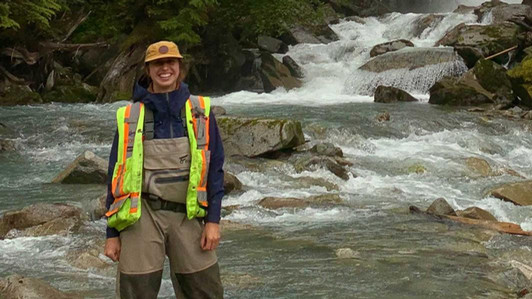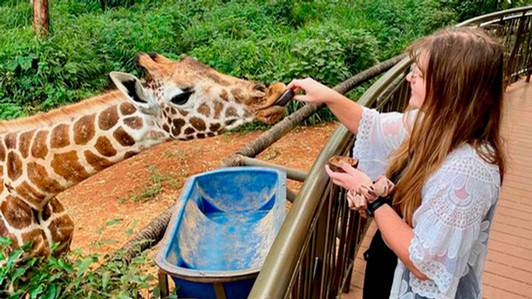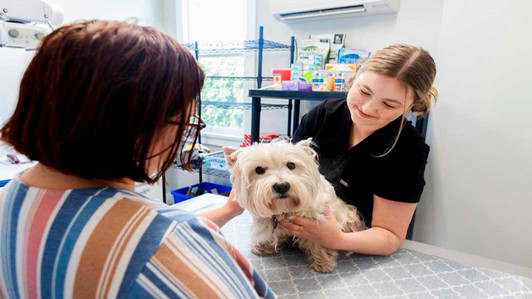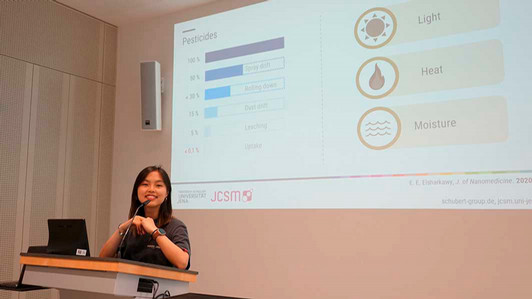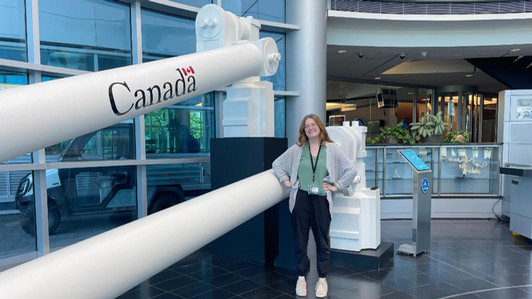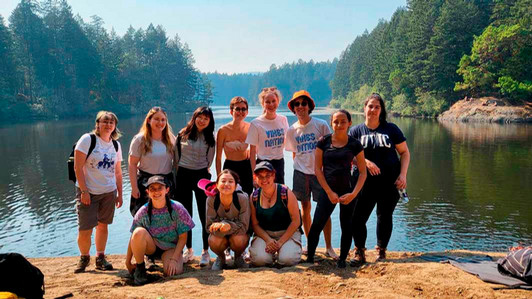Science
Science Co-op is optional for students studying:
- Biology
- Biochemistry and Microbiology
- Chemistry
- Climate Science
- Data Science
- Earth and Ocean Sciences
- Physics and Astronomy
- Mathematics and Statistics
Learn more about how co-op works, program formats, salaries, schedules and more.
Attend an online info session
Attend an information session in September to learn info about:
- how to join Science Co-op
- program requirements
- jobs that co-op students in biology, biochemistry, chemistry, climate science, data science, earth and ocean sciences, math & stats and physics & astronomy students have had in the past
- and more
Get your questions answered by the Science Co-op coordinators.
How co-op works
Co-op gives you hands-on paid work experience related to what you're studying. It's the perfect way to develop your skills and find a career you love.
Learn more about what co-op is, how it works with your degree, and what to expect as a co-op student.
How to join
Requirements to join:
- be in the Faculty of Science
- have completed your first year of study
- be a full-time UVic student
Steps to join:
- Enrol in SCIE 201 (undergraduate) by September 19, 2025
- Register in the co-op portal
We recommend joining at the end of your first year of study. This will allow you the flexibility to alternate co-op work terms with your academic terms.
If you're later in your degree, you can still participate in co-op but your schedule may look different. For example, some science co-coop students complete all of their work terms as part of a post-study internship. Contact your co-op coordinator to discuss possibilities.
Some science graduate students are also eligible for co-op. Please speak to your graduate supervisor about your plans, and contact your co-op coordinator for more information.
Once you're accepted
You'll begin your co-op education through SCIE 201: Introduction to Professional Practice classes, which you'll take once before your first work term.
The course takes place in the winter session in addition to the regular course load. It includes 50-minute in-person/synchronous sessions and a mock interview clinic.
The goal of the course is to give you baseline tools and skills to help you in your co-op (and later, full-time) job hunt. You'll learn about the hiring process, passive and active search options, résumé and cover letter writing, professionalism and ethics, interview skills, networking skills and how to be successful on your work term.
You only need to take SCIE 201 once.
Work terms
Co-op work terms begin in January, May and September and are typically 4 months long.
Finding a work term
In addition to the general process for finding a co-op job you need to complete the terms & conditions form in the co-op portal to receive access to co-op job postings.
You can connect with your co-op coordinator and academic advising to make a plan that works for you.
During your work term
Learn more about what happens during your work term.
After your work term
At the end of your co-op work term, you will reflect on your work experience by completing a:
- work term report - a scientific report on a subject you chose with your work term supervisor
- oral presentation - a short presentation to an audience of your peers
- competency assessment – a tool that is part of the co-op and career portal
You should also:
- book a debriefing meeting
- update your résumé
- complete a release form
Assignment due dates:
- work term ending in August: due September 15
- work term ending in December: due January 15
- work term ending in April: due May 15
If the due date falls on a holiday or a weekend, the assignment will be due the next business day.
See the assignment criteria, guideline and templates in the Brightspace work term course.
Sample employers & jobs
Biochemistry and Microbiology:
- academic research labs and institutes
- conducting original research using modern biochemistry, immunology, molecular biology, genomics and proteomics technologies
- pharmaceutical and biotechnology companies
- breweries, wineries and distilleries
- monitoring industrial fermentation processes
- government agencies
- testing clinical, environmental, food and water samples for microbial or chemical contamination
- food, chemical and equipment manufacturers
Biology:
- marine biology, fisheries and forestry
- Eulachon assessment and pelagic ecosystems – Fisheries and Oceans Canada (Pacific Biological Station)
- resource management
- assistant wildlife biologist – Parks Canada (Lake Louise, Yoho and Kootenay National Parks)
- pest management
- ecology and environmental monitoring
- environment regulatory and sustainability co-op student – Devon Energy Corporation
- wildlife assessment and tracking
- junior wildlife rehabilitator – BC SPCA Wild Animal Rehabilitation Centre
- botany
- biological weed and pest control assistant – Cultural Agricultural Bureau International (Switzerland)
- medical research, genetics and microbiology
Chemistry:
- academic research projects (theoretical and applied)
- pharmaceutical and biotechnology companies
- breweries, wineries and distilleries
- food, chemical and equipment manufacturers
- natural resources management and research
Climate Science:
-
climate readiness co-op – BC Ministry of Emergency Management
-
climate change co-op student – BC Ministry of Forests
-
Environmental co-op student (climate action) – City of Abbotsford
-
co-op in climate action – Coast Capital Savings Credit Union
-
service delivery co-op –Canadian Centre for Climate Services - Environment and Climate Change Canada
-
climate interpreter – Gorge Waterway Action Society
Data Science:
- data scientist intern – AlgaeCal
- data scientist co-op – Insurance Corporation of British Columbia (ICBC)
- data science co-op – Intact Insurance
- data science co-op – Kabam Games
- intern – Microsoft - Data Science
- data science co-op – MineSense Technologies Ltd
Earth and Ocean Sciences:
- upstream environmental operation, water team – Husky Energy Inc.
- research geomorphologist assistant – BC Ministry of Forests, Lands and Natural Resource Operations
- laboratory assistant, petrophysics – Natural Resources Canada
- oceanographic data processing – Tokyo University of Marine Science and Technology
- coastal naturalist – Calliope Consulting Inc.
- junior project officer – Aboriginal Affairs and Northern Development Canada
- geologist co-op student – Teck Ltd.
- underwater acoustic analyst – Ocean Networks Canada
- environmental co-op student – National Defence and the Canadian Armed Forces
- digital remote sensing research – Natural Resources Canada
Physics and Astronomy:
- academic research projects (theoretical and applied)
- computational and quantum physics projects
- renewable energy research and production projects
- geophysics
- nuclear physics
- oceanography
- medical research
Mathematics and Statistics:
- environmental assessment co-op student – Environment and Climate Change Canada
- investment operations intern – BC Investment Management Corp.
- junior developer – Workday (MediaCore)
- modelling and analytics support technician – Alberta Environment and Parks
- survey methodology co-op student – Statistics Canada
- Toronto investments analyst – Manulife Financial
Learn more about the various jobs students can do.
Chynna Tran (biochemistry and microbiology)
When Chynna (they/them) was looking for their first work experience term, they knew they wanted to work with a team committed to inclusivity and education. They found a strong fit with Science...
Jessica Horrocks (biochemistry)
Jessica Horrocks (she/her) spent a transformative summer working as an ecosystem Restoration Technician with Castilleja Conservation Society. The biochemistry and microbiology student...
Neko Kasawski (biochemistry)
When Neko Kasawski (she/her) was looking for her first co-op experience, she found the perfect way to get her feet wet. The biochemistry student spent the summer working as an assistant educator...
Piper McWilliam (biology)
As an environmental and sustainability co-op student working with the Prince Rupert Port Authority, Piper McWilliam did everything from monitoring the presence of invasive species to looking at...
Priyanka Kahlon (biochemistry)
Priyanka (she/her) spent a full year working as a molecular biology research assistant in the Molecular Genetics Lab with the Department of Fisheries and Oceans Canada in...
Abby Matheson (geography and biology)
Abby Matheson found herself immersed in British Columbia’s natural beauty when she accepted a job with biological consulting company Ecofor. The role took the geography major/biology...
Chloe Leroy (science)
UVic student Chloe Leroy had the unique experience of working remotely with Universidad Catolica del Maule (UCM) in Chile.
Christine Wong Chong (biomedical engineering)
When Christine Wong Chong enrolled as a biomedical engineering student at UVic, she was inspired by the prospect of working in a field that contributes to medical advancements that improve...
Izzy Morrissey (biology)
Izzy Morrissey (biology) has always known that she wants to be a doctor specializing in pediatrics. Her love for science and drive to make a meaningful impact on the lives of children and...
Lauren Harrison (physics and astronomy)
For physics and astronomy student Lauren Harrison (she/her), a summer co-op as a video developer in astronomical concepts at the Dominion Astrophysical Observatory was a dream come...
Morgan Chisan (biology)
Morgan Chisan's passion for the marine environment came to life during her work term as a marine experiential educator at the Bamfield Marine Sciences Centre. She was responsible for the...
Morgan Chisan (marine biology)
I'm Morgan (she/her), and I’m currently in my fourth year majoring in biology (with a concentration in marine biology) at the University of Victoria. During my fourth year, I decided to...
Nico Pryma (microbiology and statistics)
Fifth-year microbiology and statistics student Nico Pryma (he/him) has a career in medicine in his sights. He recently spent a co-op work term as a clinical trials research assistant with the BC...
Ola Przydatek (microbiology)
My name is Ola and I’m a third-year microbiology major at UVic. I spent my summer working as a research assistant at the Centre Hospitalier de Valenciennes (CHV) in Valenciennes,...
Paige Garat (biology)
Paige Garat's love for animals of all shapes and sizes led her to a co-op work term at Dand Veterinary Clinics.
Rebekah Shin (microbiology)
Rebekah Shin, a fourth-year microbiology student, spent a semester completing her co-op at the Vietnam National University as a research intern. Her co-op opportunity led her to the Biotechnology...
Sebastian Leroux (biology)
When UVic biology student Sebastian Leroux (he/him) was looking for a co-op position, he was also looking for a way to make a difference. As someone who is passionate about sustainability, he found...
Seoyoon Lee (biochemistry and microbiology)
Seoyoon Lee (biochemistry and microbiology) found the work term of her dreams at Friedrich-Schiller-Universität Jena in Germany. As a research intern, Seoyoon carved out opportunities to...
Tess Grindlay (physics and astronomy)
For a physics and astronomy student like Tess Grindlay, a summer spent working with the Canadian Space Agency on the James Webb Space Telescope was nothing short of a dream job.
Vivica Turnbull (biology)
My name is Vivica and I’m a fourth-year Biology major at Macquarie University in Sydney; and a proud Barkindji Ngemba woman. In 2022, I took part in the Indigenous International Work...
Average salaries
You'll receive a salary from your employer during each co-op work term. Co-op salaries vary according to many factors, including:
- your previous work experience
- the industry you're working in
- the responsibilities of your co-op job
Here are average monthly salaries for a work term:
- Biology: $2,958.72
- Biochemistry and Microbiology: $2,880.61
- Chemistry: $2,931.40
- Earth and Ocean Sciences: $3,338.95
- Physics and Astronomy: $3,127.85
- Mathematics undergraduate: $3,070.28
- Mathematics graduate: $4,168.00
- Statistics undergraduate: $3,070.28
- Statistics graduate: $4,168.00
Fees
Co-op students pay a co-op tuition fee for each work term. It's free to join co-op and attend the preparation course—you'll pay your tuition fee after you secure a co-op work term.
You'll pay your fees according to the same tuition fee deadlines as regular course fees.
Fees per work term for undergraduate students:
- domestic students: $807.56
- international students: $1,696.74
Fees per work term for graduate students:
- domestic students: $807.56
- international students: $1,015.71
Note that the graduate co-op tuition fee is different than the graduate installment fee. If you are a grad student and register for a co-op work term, during that term, you'll pay:
- the grad co-op program fee
- the grad ancillary fees
If you register for a course (e.g. thesis 596 or 598) and a co-op work term in the same term, during that term, you'll pay:
- the grad co-op program tuition fee
- the course tuition fee
- the grad ancillary fees
Questions about co-op tuition fees? Email us or call 250-721-7032 for assistance.
Transfer students
If you've completed a co-op work term at another accredited post-secondary institution, you can apply for transfer credit (or a work term transfer) for up to 2 work terms.
The work term that you want to receive transfer credit for must have been:
- paid
- evaluated (you submitted a final written report)
- supervised by a co-op practitioner
- a minimum of 4 months (or 420 hours) of full-time work
- relevant to your academic program
Contact the Science Co-op office to let us know that you plan to apply for a work term transfer.
Previous work experience
You can apply to register previous work you completed before entering the co-op program as a work term challenge.
The work must have:
- been completed before acceptance into the Science Co-op Program
- helped you establish and achieve your career goals
- been supervised
- totalled a minimum of 420 hours
- been paid
- helped you develop competencies, such as:
- analysis
- problem-solving
- decision-making
- organizing/managing self and others
- written/verbal communication
- technical/computer
- interpersonal relations
- initiative and self-reliance
- industry/job specific
Office & contacts
Our regular business hours are Monday to Friday, 8:30 a.m. to 4:30 p.m.
Science Co-op is located on the second floor of the Bob Wright Centre (BWC).
Biochemistry and Microbiology (BCMB)
Co-op coordinator:
Heather Croft
Office: BWC A237
bcmbcoop@uvic.ca
250-721-8813
Biology, Earth and Ocean Sciences, & Climate Science
Co-op coordinator:
Alicia Rippington
Office: BWC A239
bioeoscoop@uvic.ca
250-721-7713
Physics and Astronomy / Chemistry / Mathematics and Statistics (PACMS) / Data Science
Co-op coordinator:
Brian Tucker
Office: BWC A241
scicoop@uvic.ca
250-721-8649
Science Co-op assistants
Kandie Husband, Jessica Abriel and Annette Bailey-Smith
Office: BWC A243/245
scico@uvic.ca
250-721-6122
Get support
We're here to support you with every step in your co-op journey, from applying to co-op to making sure you're supported at work. Contact your co-op coordinator or office for assistance.
If you identify as having a disability or a mental health condition, if you belong to an equity group, or if you identify as Indigenous, we have additional supports for your co-op experience.
Science Co-op blog
Read recent stories and student experiences on our Science Co-op blog.
Find answers to commonly questions about Science Co-op on our FAQ.






